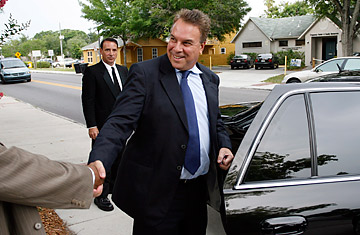
Jeff Greene, Democratic candidate for U.S. Senate, campaigns in St. Petersburg
(2 of 2)
Nevertheless, Greene, whose positions include support of green technology and "crippling sanctions" against Iran, may be poised for an upset. His barrage of ads, which often include his 83-year-old mother and her fellow Florida "condo commandos," have lifted him in the unemployment-ravaged state to within two points of Meek, 27% to 29% — with a sizable 37% undecided.
Scott, 57, a lawyer and former Navy radarman who made his fortune acquiring hospitals in Texas, was never personally charged in the Columbia/HCA scandal. (Four other company executives were charged; two were convicted, but the convictions were later overturned.) Still, Columbia/HCA admitted to fraud including the falsification of diagnostic codes, giving doctors financial incentives to drum up patients and billing Medicare for bogus lab tests — all while Scott was being lionized (including in TIME) as a cost-cutting health care industry savior. Scott addresses the disgrace in some of his ads, though not exactly in the forthright manner he likes to excoriate "career politicians" for avoiding. "Mistakes were made, and I take responsibility," he says in one spot. "But I've learned from them and moved on."
Voters and the media have so far let Scott (who declined an interview for this article) and Greene "pretty much define themselves with their commercials," says Sean Foreman, a Florida politics expert at Miami's Barry University. "They've gotten a fairly free ride to the top of the polls." Now, however, "these guys are going to be facing more scrutiny," and their "support is likely to level out and maybe even drop." For Scott, who is still in the health care facility business, some of that scrutiny may also fall on his ardent support for offshore oil drilling despite the massive Gulf oil spill, and on his nonprofit organization Conservatives for Patients' Rights (CPR), which he founded last year. CPR has been widely accused of peddling misinformation about President Obama's health care reform, including claims that patients will no longer be able to choose doctors or health plans.
Still, Foreman notes, Republican and Democratic leaders in Florida "are very nervous" about the Scott-Greene surge — which is also a reflection of how disillusioned voters in the crucial swing state are with both parties. Critics can accuse the multimillionaire Scott — who so far has outspent McCollum $12.5 million to $800,000 — of buying his double-digit poll edge. But the charisma-challenged McCollum isn't helping voters forget the fact that the Florida GOP is mired in a broad embezzlement scandal that this month saw the indictment of the state party's former chairman.
But both Scott and McCollum lead the likely Democratic gubernatorial candidate, Florida chief financial officer Alex Sink, by as many as 10 points. Florida Democrats, meanwhile, have still not recovered from losing their state dominance to Jeb Bush and the GOP a decade ago. Meek's campaign is hobbled by questions about his ties to a developer who was indicted in a case involving the theft of $1 million in public funds for unfinished projects in Meek's low-income South Florida district (the developer has pleaded not guilty and is awaiting trial). And even if Meek defeats Greene, the Quinnipiac poll puts him a distant third in the Senate general election, 20 points behind the leader, Florida Governor and Republican turned independent Charlie Crist, and 16 behind the likely Republican nominee, former Florida house speaker Marco Rubio. Greene trails Crist by 26 — a sign, some fear, that he could drive Democratic voters such as women and African Americans to Crist in November.
Florida, inordinately populated by newcomers, has a long history of embracing outsiders, for better or worse. Scott and Greene have so far succeeded in testing the limits of that inclination.
